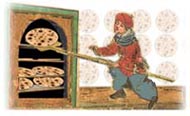| The Passover haggadah reminds
us to welcome the hungry and the needy to our seder, so that all might enjoy
a taste of freedom. Each of the following tales focuses on the message of
a well-known Jewish personality regarding the needs of the hungry. |
1. Supervising the matzah baking
 Rabbi
Israel Lipkin Salanter [1] was most meticulous
in the baking of matzot (unleavened bread) for Passover. To make certain
that everything was done according to the strictest interpretation of Jewish
Law, he personally undertook to supervise the baking. Rabbi
Israel Lipkin Salanter [1] was most meticulous
in the baking of matzot (unleavened bread) for Passover. To make certain
that everything was done according to the strictest interpretation of Jewish
Law, he personally undertook to supervise the baking.
One year he was bedridden and unable to go to the
bakery. He instructed two pupils to go in his stead. As the pupils were about
to depart for their assigned task, they asked their teacher: "Is there
anything special that we should watch?"
"Yes," the rabbi replied, "See that
the old woman who does the mixing is paid sufficiently. She is a poor widow."
2. Milk at the Seder
 A
local Jew came to Rabbi Akiva Eger of Posen [2]
on the eve of Passover. "Rabbi, I've a ritual question to ask you,"
he said: "Is it permissible to use four cups of milk at the seder instead
of four cups of wine?" A
local Jew came to Rabbi Akiva Eger of Posen [2]
on the eve of Passover. "Rabbi, I've a ritual question to ask you,"
he said: "Is it permissible to use four cups of milk at the seder instead
of four cups of wine?"
"Why would you want to substitute milk for
wine? Are you, God forbid, ill?"
"No, rabbi, I am well but I can't afford to
buy wine."
The discerning rabbi then said: "I'm sorry.
It is forbidden to use a substitute for wine." Reaching into his pocket,
he continued, "Take these twenty rubles and purchase wine."
After the Jew had left, the rabbi's wife angrily
chided her husband:
"Why did you give him twenty rubles for wine?
Two or three would have been sufficient."
"Don't be angry," the rabbi answered.
"The fact that this poor man was prepared to drink milk at the seder is
evidence that he also did not have money to buy meat and perhaps not even fish
and matzot. With twenty rubles he will be able to observe the seder properly."
3. Baron Rothschild
The eve of Passover has arrived and Shmuel and his pious wife Rivkah were bemoaning
their dire poverty and especially their lack of earthly goods required for the
proper observance of the festival. They considered many ways to cope with the
tragic plight, but none seemed suitable. Finally, Rivkah prevailed upon her
husband to appeal directly tot he Almighty and to dispatch a letter Him explaining
their predicament. Shmuel wrote an appropriate missive and cast it to the winds
with a prayer on his lips that the message might soar aloft to His Heavenly
Abode.
Baron Rothschild[3]
happened to be riding in his carriage in the neighborhood and noticed the letter
lying on the road. When he read the urgent appeal, his deepest sympathy was
aroused. He send his servant with a hundred rubles for Shmuel.
The servant delivered the money in the name of
Baron Rothschild. Without a word of appreciation to the servant or the Baron,
Shmuel turned to his wife and said: "See, Rivkah. God has sent Baron Rothschild
as His messenger, I wonder how much Rothschild deducted for expenses."
 |
[1]Rabbi Israel Lipkin Salanter
(Lituania and Germany, 1810-1833) was the founder of the Musar Movement
that stress ethical behavior in addition to tradition study and observance.
[back]
[2]Many popular legends surround
Rabbi Akiva Eger (Germany 1761-1837) who was known for his modesty, humanity
and benefience, which were admired even by his opponents. [back]
[3] Although several members
of the Rothschild banking dynasty were titled "Baron," it is
not certain that the Baron Rothschild referred to in this story refers
to a specific historical figure. "Baron Rothschild" may be a
prototype for the generous, wealthy Jew. [back]
|
 |
 From:
The Passover Anthology, ed. Philip Goodman. Jewish Publication Society,
1993.
From:
The Passover Anthology, ed. Philip Goodman. Jewish Publication Society,
1993. |
NISAN Table of Contents
|



